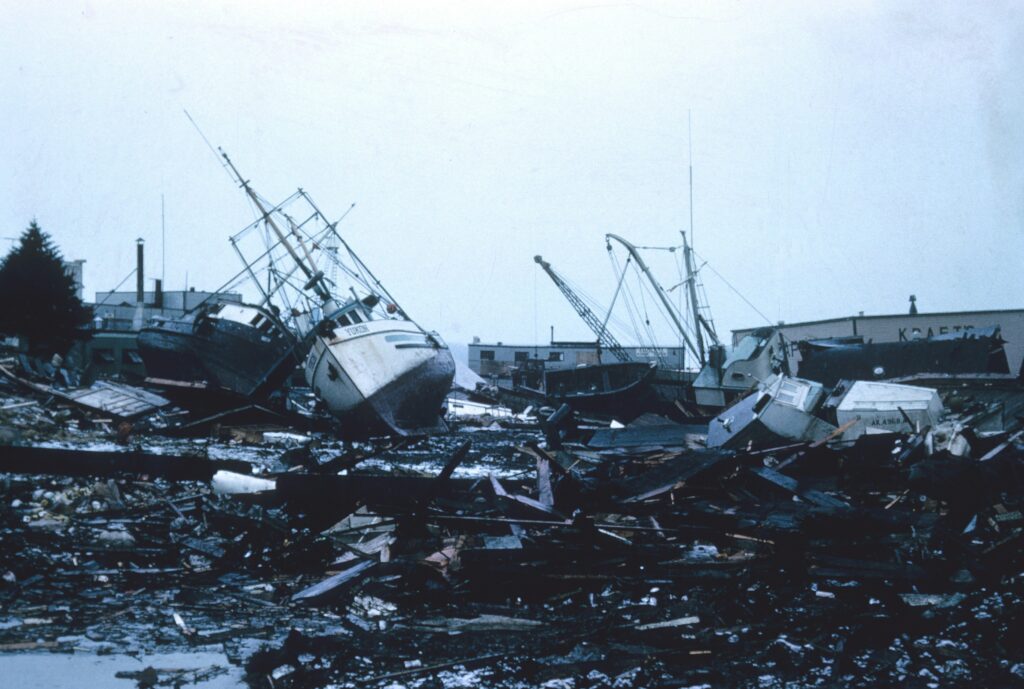The Official Literary Journal of University of Southern Maine's Stonecoast MFA
Oyster City Under Water

By Madison Garber
Morning dawns gunwale gray and wet in Oyster City. The hurricane, first a roar in the night, then a howl, now a whisper of sea spray over the coast, barrels farther inland. Curtains of rain hang in the silence between gusts. The city stirs, ready to probe its wounds.
On the edge of town, Billy heaves three sets of waders into the bed of his pickup. His son Tyler watches him through the rear windshield. A string bean of ten with his momma’s eyes and his granddad’s sea legs. His mouth is tight with worry. On the bench seat beside Tyler, Joe aims his gaze over the dash, but Billy knows the look his father wears. It’s come on slowly over the years, first during the water wars with the cities upstream, then with the oil spill, when every oysterman took to the bay to harvest before the slick could kill their beds. Picked the bottom clean. With time, the oysters dwindled. Then, the oystermen. Now this.
Billy climbs in and starts the truck. The going is slow. He winds around downed trees and debris lathed from shops and homes. Soon, the city will be a symphony of chainsaws. Now, only his V8 grumbles through the post-storm quiet.
As he drives, Billy thinks about the day Joe handed him his first set of oyster tongs, three times his height, capped with metal rakes. Billy struggled to heft them into the water. Nearly tumbled in. Joe helped him pinch the tongs, a giant pair of chopsticks, until they snagged on the rough shell below. Together they hauled their catch onto the culling tray. Joe showed him with a calloused palm how to measure the weight of a good meal. Tossed back the rest.
Hauling oysters made for long, hot days, and Billy would be sore long after. But in the evening, when the sun dipped into the gulf beyond the bridge, his Uncle Holton would ease his boat next to theirs and toss over cold cans of Bud. Crisp crack of aluminum. Rush of fizz. The liquid spilled onto the deck, stickied toes. Billy sipped foam from Joe’s can, nose wrinkling at the hops. They bobbed on the rising tide until his uncle puttered off for a burger onshore.
Holton left oystering not long after the spill. Found his first job on land, where the tide of thirsty locals was more reliable than the river. Billy turned to oyster farming. He’d restore the beds his great-grandad made when the bay was full of tongers’ boats. Or that had been the hope.
Billy drives on. In town, the pulse of the single streetlight is dead, the streets under water. He parks near the sand-bagged liquor store where the tide has pulled back, leaving blankets of seaweed and mud. The air smells sour with oil.
Eight feet of surge, Billy thinks. Enough to drown a livelihood. A legacy. Still, they shrug into their waders and slosh south toward the market. Mud sucks at Billy’s feet. Twice Tyler stumbles in his too-large waders. The tide tugs them onward.
Their seafood market sits like a half-rotted fish in the surge: roof panels stripped, beams exposed. Rain pours in the open wounds, pebbles Billy as he stares. Inside: giant coolers, ice makers, stainless steel tables upended. Chunks of drywall float with metal trays and plastic crates. Steel garage doors, crumpled like paper, begin to rust in the brackish tide.
The math hurts. His wife’s car in the shop, their mortgage, Joe’s meds. And now, a ruin. Billy turns away. Scrubs hard at his jaw. Then he clears the sting from his throat and says, I’m gonna check the seeds.
The dock out back is half-pitched into the brown froth of the river. Billy picks his way over the bobbing timber until he finds the piling where his cages are tied. He draws one in, hand over hand, until the cage emerges. Water spills from its pores. Billy holds his breath and opens the cage door. Inside: a mound of shells, each no bigger than a fingernail. He scoops out a handful, cold and rough in his palm, and waits for a sign of life. When the mottled shells clamp shut, he exhales.
They make it? Joe asks. He stands onshore with Tyler. His skin is toil- creased and slick with rainwater.
They made it, Billy says.
He replaces the oyster seeds and lowers the cage again. He backtracks to the riverbank, where Tyler waits, eyes wide. Look, he says.
Billy follows his son’s finger to the bay. He spots movement beneath the waves. Shrimp. Thousands of them. Pinkish bodies rippling, as they swim upstream.
What’re they doing? Tyler asks.
They can’t breathe, Joe says, and it takes Billy a moment to understand—the mud onshore, the rich river bottom turned over by the surge, the water brown and thick.
They watch the shrimp struggle, searching for breath. The bay is wind- churned and flowing. Joe closes his eyes. Billy reaches for Tyler’s shoulder. He breathes in the sweet sting of salt.
This story originally appeared in Stonecoast Review Issue 20. Support local booksellers and independent publishers by ordering a print copy of the magazine.
Photo by Vitor Pádua
- Built using Kale Pro by LyraThemes.